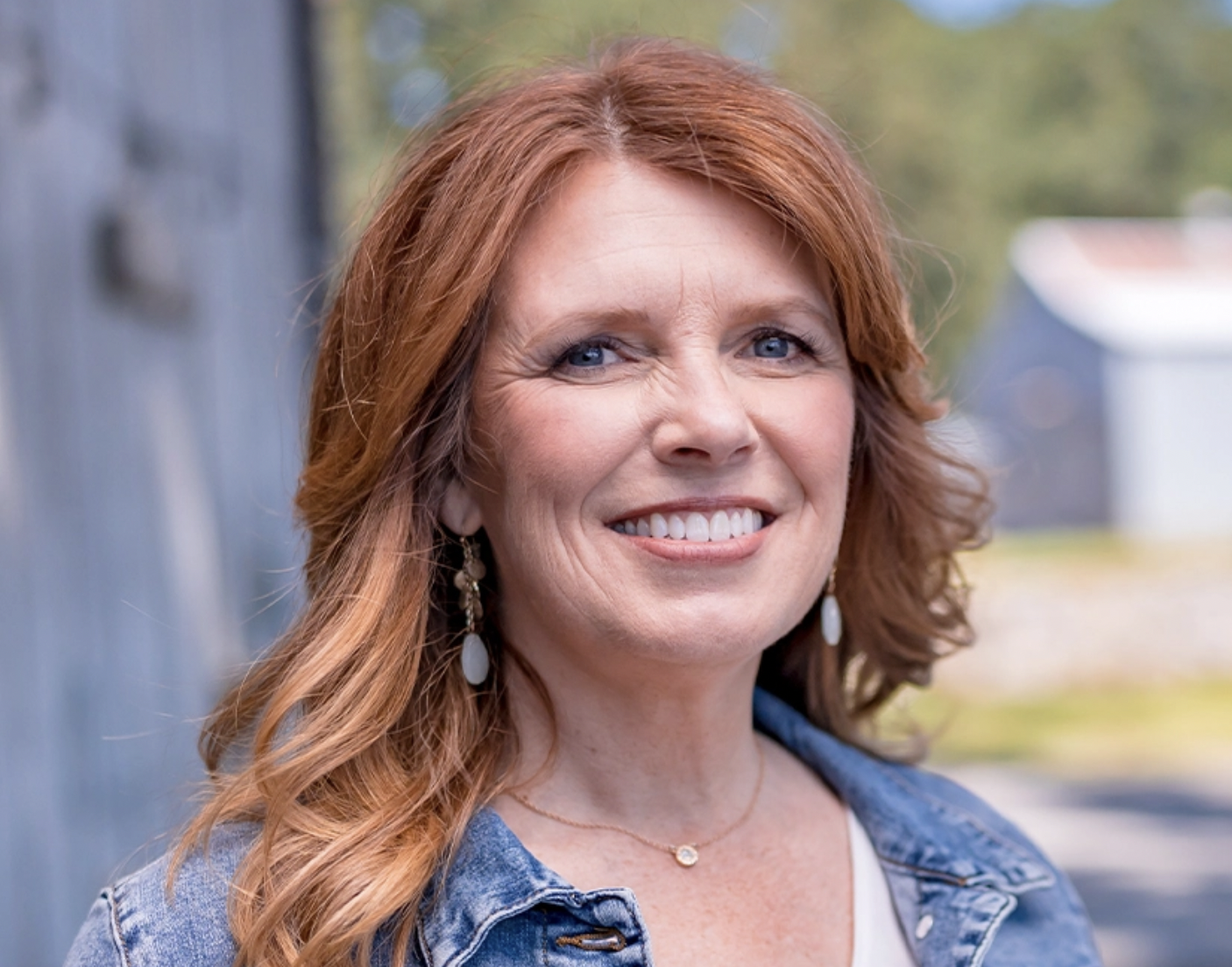
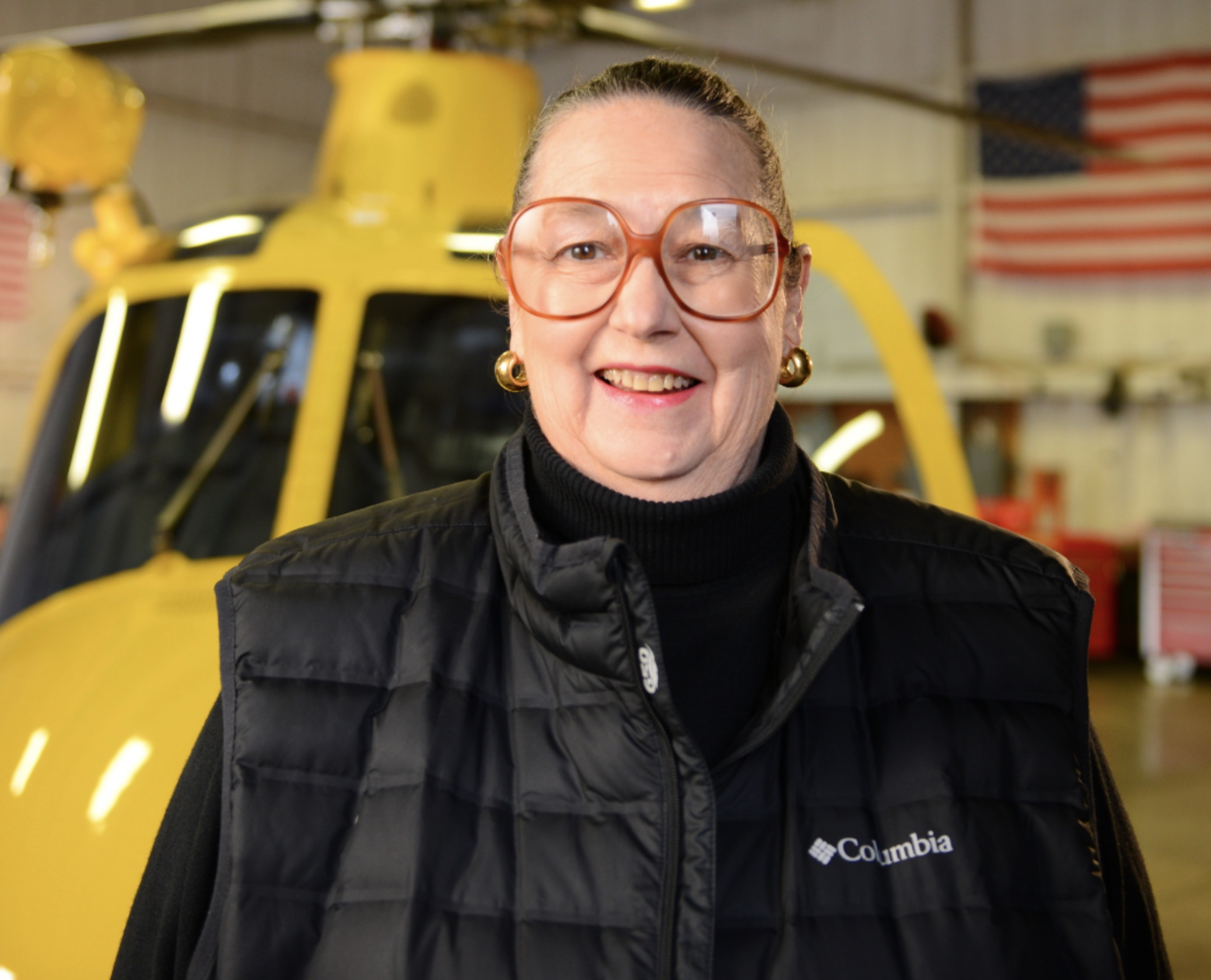

We have several elections here in Oregon that are being closely-watched across the country, but none more so than the race for governor, in which unaffiliated candidate Betsy Johnson and Republican candidate Christine Drazan both stand a chance at beating Democrat Tina Kotek and ending Oregon’s decades-long streak of blue leadership.
Drazan, Johnson and Kotek’s platforms vary widely on many issues, and their climate policies are no exception. Oregon Public Broadcasting reporter Dirk VanderHart recently interviewed the three candidates on the important topic of climate change.
Although Oregon’s biggest environmental pressure point has historically been the timber industry, the climate impacts of our transportation system have more recently come into the spotlight as a top issue for Oregon voters. (After all, the transportation sector is the largest contributor to greenhouse gas emissions in Oregon.)
Here’s how each candidate responded when asked, “Do you support widening highways as a strategy to ease congestion? What specific steps will you take as governor to decrease greenhouse gas emissions from vehicles?”
Christine Drazan:
With respect to transportation, consumers should have the option to purchase an electric vehicle, it shouldn’t be a requirement and our current energy grid cannot support a prohibition on gas or diesel-powered vehicles. I support widening our highways, by building more lanes. I believe we can both reduce traffic times and reduce emissions from idling engines. But this is an incomplete solution unless we address jobs. We need to ensure that people can access work within a reasonable distance from the home that they can afford. As long as we place housing and jobs at opposite ends of the metro area, we will face congestion challenges, we must take a more holistic approach and provide economic opportunity to all communities.
Betsy Johnson:
Of course I would increase highway capacity when necessary to more efficiently move vehicles through our highways. The more we maintain efficient flow, the less emissions will be released. I believe vehicle emission standards must be addressed federally to keep Oregon businesses competing on a level playing field.
Tina Kotek:
When investing in transportation infrastructure, we should be ensuring our roads and bridges are safe. We should also be adding transit options and improving bike and pedestrian access. I don’t think this is an “either/or” conversation. I believe we can have safe roads that aren’t clogged with traffic all day long and smart strategies to reduce pollution from cars and trucks.
You can find out more about the three candidates’ climate policies in the full OPB interview. And thanks for asking this question Dirk!



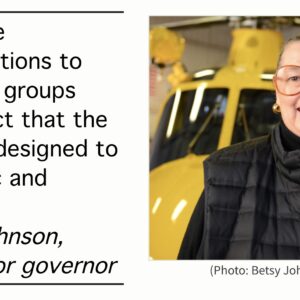
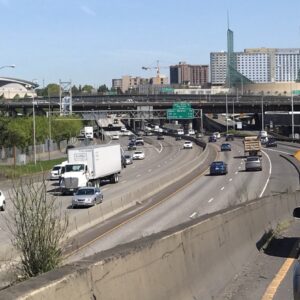
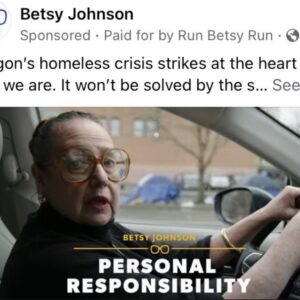
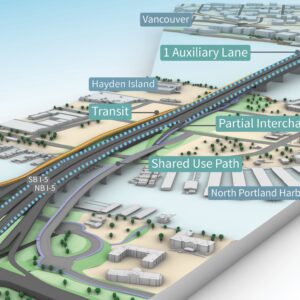
Thanks for reading.
BikePortland has served this community with independent community journalism since 2005. We rely on subscriptions from readers like you to survive. Your financial support is vital in keeping this valuable resource alive and well.
Please subscribe today to strengthen and expand our work.
Man, am I gonna have to hold my nose for this one…
Wow! No real difference between the three candidates. I had some idea that Oregon had moved far to the right, but even I’m surprised how pro-highways Tina is – has the guy with the orange hair already endorsed her?
two of the candidates said they support widening freeways, the third said we should address safety and proactively offered we should be adding transit. How on earth do you read that as “no real difference” between the three candidates? A Governor Kotek will certainly need to be lobbied to make the right transportation investments, but that in of itself is a categorical improvement compared to the two other candidates, who appear to be pretty much in lockstep opposition to anything approaching sensible transportation policy.
Anyone who genuinely wants to decarbonize transportation would want roads to be clogged. Like her close ally, Brown, Kotek has never met a freeway she would not expand.
Who should we vote for in November?
Cthulu – when you’re tired of voting for the *lesser* of two evils 🙂
anyone who wants to decarbonize transportation would recognize that “stop all freeway expansions” is a bit like “defund the police” in that it is objectively a pretty stellar public policy proposal and also to get elected by a statewide electorate maybe it’s ok if we don’t expect our candidates to use the same language and rhetoric to achieve policy victories in the direction of our goals
the delusional hope that kotek, another corporate-funded party machine candidate, will support a few mild reforms is part of the bait and switch that has elected regressive anti-poor governors for decades.
will those policy victories help pay the rent of a tenant who gets a 14% rent increase due to Kotek’s “rent control”?
#@$% the “policy victories” of the oregon democratic party.
besides, Soren, it’s exhausting hearing you talk about what you think is the best way to oppose freeway expansion in the bikeportland comment section after having spent the last five years of my life building a movement to do that very thing. turns out bikeportland comments are, for this particular fight, not all that relevant compared to literally everything else we’re doing to change the zeitgeist!
Aaron,thasnk for all of your hard work! You have changed adn improved the conversation around the Rose Quarter project and support a lot of valuable youth activism. For fighting climate change and freeway expansion, do you htink Kotek has the political will and/or personal commitment to push for any changes to what is already planned?
tactical optimism. i believe she has far more potential than the other candidates, and we sure gotta try. failure isn’t an option.
except that i did not do this.
IMO, opposition to freeway expansion is a reformless reform that mostly functions to preserve the status quo. Therefore, I am motivated to point out the cognitive dissonance of a “nomorefreeways.org” founder vociferously campaigning for a candidate with a sterling record of support for freeway expansion.
Kotek is simply saying “no tradeoffs — we can do it all”. In other words, she’s lying (whereas Johnson and Drazan are just wrong). She’s certainly not worse than Johnson or Drazan, but there’s no reason to think she’s much better. She’s just speaking to her voters. And while Kotek mentioned transit and bikes, Drazan mentioned landuse, so that’s good, right?
I assume that regardless of what they say here, Johnson and Drazan are pro-highway. Is there anything in Kotek’s legislative history that suggests she’d make politically difficult choices to move away from a highways first approach?
she ultimately voted no on HB 3055, citing the need to right-size projects, even if she did whip the votes for it.
Drazan is basically advocating for company towns. But sure, they’re all the same.
It sounded to me like she was advocating for better landuse policies to reduce long commutes. I totally agree with her on that point (though I don’t at all trust her to deliver).
The comment doesn’t really make sense, though. In the Portland metro, we have industrial, commercial, and residential mixed all over the place. If you want to live near work, you theoretically “can”. Reality of economic mobility and the cost of housing is generally the biggest barrier.
I have a feeling she is thinking more about the small town “everyone lives close to work” thing. That doesn’t really work when a metro area is a mash-up of many small towns on the fringes. People can find work close to home, but that is going to severely limit their economic prospects.
In summary, it seems like in addition to not understanding induced demand, she doesn’t understand how cities work.
Of course it doesn’t make sense. None of these answers really do, because they are all just political blah blah. If you want to know what people are likely to do, look at what they’ve done.
I don’t know the future, but one prediction I am pretty confident about is that our next governor is not going to make you (or me) happy when it comes to highways (or, I suspect, happy at all).
PS Don’t hold a misunderstanding of (or complete ignorance of) induced demand against Drazan — most people here don’t get it either, thinking it’s some kind of fairy dust you can sprinkle over a project to discredit it. We’ve seen over and over that it just isn’t effective.
Drazan is wrong though. The most efficient land use is to have all high-frequency destinations in the center, because people move and people change jobs.
A metro area isn’t a collection of small towns, where people can choose to live right next to where they work. Households now days often have 2 or more people who have to get somewhere everyday, whether school, work, social events, shopping, etc. – some of those like elementary schools and supermarkets can be in every neighborhood, but some are naturally going to draw from the whole city and state.
There are only a few big tertiary care hospitals because that’s what’s efficient: when you need heart surgery you want a high-volume, experienced surgeon. When you want to get your e-cargo-bike repaired you might need to go to a speciality bike shop, not just the closest one. If you want to a live music or theater, you don’t just want to see the closest band or community event, you might want to see the broadway tour or the big show.
If regional job and entertainment destinations are place on the periphery of a metro area, most people will have to travel 1.5 to 2 times the radius of the city to get to them . If all major destiations are at the center, on average the trip length will be only 0.75 time the radius: in Portland that’s the difference between an average trip of 25 miles (e.g Gateway to Hillsboro) or 8 miles (Gateway to Downtown).
But since residential density should be naturally higher near the center, the benefit for the average person is even higher if destinations are concentrated at the center of the metro area. Shorter average trips to a higher density destination also make transit much more competitive with cars, creating a virtuous cycle of reduced trip length, reduced driving and concentration of services and activities.
Great in concept, lousy in execution. If Portland was for example to operate as you describe, then it would have to have a transportation system (road, MAX, bus, rail, bike routes, etc) where capacity and use increase as you get towards the center, wherever that is (the population center of the city is actually closer to Hollywood than to downtown) – so you should be in favor of expanding freeways, MAX and other systems as such over any other sort of land use – demolishing parks, housing, offices, and so on to add transportation capacity. Almost no city in the US operates this way for very long nor most cities in Europe. London, the capitol of a highly centralized government, actually has all of their giant stadiums in the suburbs, so that they can move people to them without wiping out the center city; similar in Paris, Berlin, NYC, and nearly every other major metro area. Vancouver BC’s largest mall is in a suburb connected to the Skytrain. A better model is what some term as a galactic cluster – multiple major centers – you know, like on the Metro 2040 plan?
What are you talking about??
Two of them said point blank that they would widen the freeway. Only Tina said anything about improving bike or pedestrian access.
Serenity & Aaron, Tina has basically said that she isn’t willing to make any either-or decisions on transportation. Given Oregon’s very limited resources and much-needed adjustments for climate change, she has more or less said she’ll be indecisive to the nth degree. I grant you that the other candidates may not be any better, but they are certainly more likely to be decisive – they aren’t trying to defend their bad records like Tina is. I’m sorry you have such a poor selection of candidates, almost as bad as what we had for our last election here in NC.
There is no reason to parse “not an either/or question” as indecisiveness.
i agree Tina’s platform and rhetoric at this point doesn’t 100% match mine. But are you suggesting, David, that somehow hers isn’t qualitatively different than her opponents? And that it’d be a meaningful step forward to have Kotek making OTC appointments than Betsy Johnson or Christine Drazan? Like what do you think this absolutism is winning you at this point?
Sure there is. This kind equivocation (unwillingness to support transformative change) from democratic party candidates has meant automobile-centric transportation funding with crumbs for alternatives for decades.
That’s not indecisive.
I visited Swan Island this weekend. This was once my favorite beach in Portland: sandy beaches, great views of the Fremont Bridge and the West Hills, a wide path on the top of the bank. Riparian trees and shrubs support a population of rabbits. I would regularly see Beavers, Osprey, lizards and snakes. For the last couple of years this has been a rotating series of camps that cause a lot damage. This past spring, the camps were getting big as teh water levels rose. The campers moved out and tons (literally) of garbage went into the river. Tons more was left. I have reported this to the State who took care of this in the past. This time nothing happened. All summer long the camps have grown, there are now multiple abandoned boats on the beach (waiting to be swept in toeh river when water levels rise). Bikes and scooters are in piles. Cars and vans are frequently on the path. Whats my point? I was so sad and disappointed to see the condition of the riverfront, I wondered who I could ask for help, and I realized the buck stops with the Governor. I feel that not taking care of our rivers, ignoring climate change by appointing Beyers to the OTC, generally not providing any leadership for climate change, environmental stewardship, or homelessness is a tacit support for Betsy Johnson. Tina Kotek is widely seen as a continuation of business as usual. Gov. Brown is incredibly ineffective. I think Drazan and Johnson would be bad news for climate change and the environment, but I don’t know if Kotek is any better. She, and Brown, proclaim their values, but they do not take actions to back them up. Johnson has an appealing swagger (that I find revolting) that is appealing to a lot of people. I fear that Gov. Brown’s inaction is dooming us to a strongman-type governor.
Actually, the buck stops at you. Why don’t you lead a volunteer community cleanup effort? It may be tricky to move the boats but anyone can haul away trash and avoid this mess. I’ll tell you what, I’ve got a cargo bike and be your first volunteer.
You wouldn’t get me going near that trash without serious PPE.
Ride the 205 path through a camp at 0 dark thirty sometime and try to count the number of rats that scurry through your wheels. Can you say “disease vector”?
Needles, broken glass with god know what blood born pathogens.
There’s a reason they didn’t just have a volunteer cleanup of the park blocks that Occupy Portland took over – we as ordinary citizens are not equipped for the hazards that these camps create.
I cleaned that beach weekly/bi-weekly for years. I slowly recruited over dozens of neighbors to join me. After camps were cleaned, I hauled many tons of rock back to bank. I continue to pick up trash on this beach and on Poets Beach, but this is unsustainable. We have a state agency charged with keeping our river clean and citizens cannot do it alone. I appreciate the sentiment, but you do not know what you are talking about.
I don’t think anyone from any party is excited about this election. How do we always end up with such terrible choices?
Partisan primaries, plurality voting, and the current campaign finance system.
This is one of the reasons I’m so pro Portland charter reform – I want it to work, and be a model for state-wide reforms* (to address one and two above – three is a different can of worms).
*But with STAR instead of ranked choice plz
So how come Alaska got ranked choice voting and Oregon didn’t?
To provide a protection scheme for Lisa Murkowski against her far-right flank.
…I wish I was joking. I could certainly be wrong – I’ll freely admit to not doing any deep dives into Alaska politics, though their foray into ranked-choice has offered up some fascinating results. Worth clarifying that their version is very different to the version currently being offered up in Portland’s charter reform, though.
How the hell is it that 2/3’s of the potential governers-elect don’t know how induced demand works? We’ve known about it for 80 years, and somehow these numbskulls think you can just build your way out of congestion. News for Drazan and Johnson: the only way that works is with macroeconomic decline. Is that really your pitch to fix transportation in Oregon? Make everything so bad that people don’t want to come here anymore?
“A sinking tide lowers all boats.” It’s the contemporary progressive mantra.
Because they are either (a) stupid or (b) don’t care because they just say what is needed to get elected.
Betsy Johnson is (from people who worked directly with her) stupid and a bully who reacts with aggressive bullying to cover her shortcomings.
Nobody in this country is capable of forcing the changes that we need to make. People, on the whole, are selfish, short-sighted and not overly bright and need to have their noses rubbed in the pile of feces they left on the rug to get the point.
7 years. That’s how long I expect to be around here. Then I’m out. I have little respect for humanity, but there are at least some places in this world where smart people forced policies through to make a better place to live.
I share your frustration, and have thought about leaving this country, and all of its selfish, deluded people behind. I’m just not sure there’s anywhere in the world where corporate interests don’t own the politicians. Where are you thinking of going?
There are places in Europe with dramatically lower traffic violence and gun violence. It doesn’t mean that stupidity isn’t just as endemic in those countries, just that the regulations reduce the effect on other people.
Finland (hey, it might be a nice moderate climate by the time I’m 80). Belgium (in many cities they’re actually taking elevated roadways out). I like the superblock concept they’re enacting in some Spanish cities, but maybe to warm/sunny for my pale white celtic/germanic butt. Portugal has nice stats and more moderate cost of living. I’ve managed to make it to 55 with only one MOHS procedure for skin cancer – my sunblock bill on the Iberian peninsula would be a bit higher :).
Traveling within Europe should be much easier from just about any place we pick (since that’s part of our plan for retirement, definite bonus).
Believe me, Europe is just a dysfunctional as the USA, you just don’t see it from afar. And if you remain a visitor there, you may be able to remain a bit aloof and be sheltered from some of their wigginess.
The grass is always greener…
Eh, to an extent. The way I look at it: Everywhere’s going in the same (bad) direction, but a lot of places in Europe (northern/western) are 10/20/30 years behind – that is to say, it’ll take them that long to get as bad as we’re at in the US, and by then we’ll be 10/20/30 years worse still.
Take the UK as an example – their political path mirrors ours considerably. They even had their own Trump-like head of state – they also passed on their own Sanders-like candidate. But they have trains and healthcare. Are rightwing forces working on rolling those back? Absolutely. Will they succeed? Probably, eventually, but they have them today, which means they’re starting from a better position in their decline today than we are.
Perspective creds: I lived in the UK and Germany for the better part of a decade.
I think it’s a lot harder to unbuild these things than to simply stop them from happening in the first place.
I don’t see the Flemish abandoning their current course and buying bro-dozers and the like any time soon, for example.
So, they start in a better place than we do and will probably (in these simple metrics) slide backward at a slower pace (if at all).
I’ve lived abroad (Europe and elsewhere) for a big chunk of my adult life as well, and, using Germany as an example, it is true that their healthcare system is in some ways better than ours (especially in terms of access and payment), but it also true that we still have some of the best healthcare in the US (thinking on an individual level, not a systemic one).
If you focus only on one aspect, as many people do, it’s easier to say Germany (near universal coverage) or the US (better doctors in many technical fields) is better, but in truth they’re different, and both systems have strengths and weaknesses. You may prefer the balance Germany has struck (and maybe I would too), but it is not better in some absolute sense.
One area where I heard many lamentations was from Europeans who were trying to start businesses and found the regulatory environment painful and frustrating. Those are the same regulations that protect consumers and the environment, and whether trading dynamicism for safety is worthwhile is a values judgement. Again, not necessarily better or worse, just different.
So if you believe life will be better in all regards in Europe, you are fooling yourself. If you understand they’ve struck different balances and are prepared for negatives you may not have considered (train strikes leaving you stranded, for example), you may well love it.
If all political discussions contained nuance like your comment, we’d all be smarter and much better off. Thank you, Watts.
There is no question that gun violence and traffic violence in these countries are vastly lower than ours. The fact that human beings in general are crap is not up for debate, but they start in a vastly better spot than we’re in right now.
For someone who just needs things to be halfway decent until about 2055ish (based on the lifespans of my relatives) – that’s a way better place to be than here.
I don’t have kids, I’m just hoping that the major “correction” the human race is going to receive happens after I die/in a place well away from me.
Unfortunately I think that will start in the US sooner than in the places I mentioned.
You and I are on the same page. Though I’m hoping for 2070ish. I’m not optimistic.
As I remarked elsewhere, write in “Greta Thunberg.”
Or you could decide to not support this immoral corporate fascist system by not voting.
Withdrawing in disgust isn’t the same as apathy, but it does lead to similar outcomes.
Voting for (and by extension supporting) the lesser EVIL again and again leads to morally perverse and inhumane outcomes.
To not participate is to support the greater EVIL again and again.
Tina Kotek’s most concrete impact on the environment has been to send Portlanders fleeing to the suburbs.
True, Mark, but we really have ONE choice, which is to vote for Tina. The other two candidates will take cycling choices away. Also if you decide not to vote at all, then your nonaction favors Drazan or Johnson.
It’s the reality of our two-party system, which Johnson is trying to disrupt.
“The other two candidates will take cycling choices away.”
In just a few short years, the policies of Tina Kotek and her allies have rendered bike paths unusable and the MAX unsafe. And whereas we were once an example for others to follow, right wingers across the country now point to Portland as a cautionary tale, which matters on the environmental tally, too.
“Also if you decide not to vote at all, then your nonaction favors Drazan or Johnson.”
This millennium, I’ve voted for a non-Democrat only once…Soon, twice.
I’m ignorant on this. How did she do that?
That would explain why housing prices have been plunging in Portland. Oh wait, they haven’t?
I’m not surprised but it also shows how awful Johnson or Drazan would be for Oregon.
Just one more lane bro
I’d be worried if I were a Kotek supporter. Both WW & the Oregonian ran stories this week on the national Democrat party pouring millions of $ into OR Governor’s race because they know Tina is in trouble regardless of which polls you believe or don’t believe. Just think that is unfathomable in a state as DEEP BLUE as OR. Oregonians are looking at what they see with their own 2 eyes on the streets around them & don’t like what they see. The fact remains there is only 1 party that has had complete control of OR state government for 40 years and most voters are now wrestling with if it’s time for a change.
I agree it’s time for a change. We need to go even more blue because the moderate, establishment Dems that have controlled Oregon have left us vulnerable. Hopefully Kotek embraces more progressive populism so she can excite the base and win the election and start to clean house of the boring, status quo Dems!
With all due respect Jonathan you’re kind of preaching to the choir here on BP. I’m guessing if you took a poll of all BP readers on the Governor’s race the results would be 95% Kotek, 3% Johnson, 2% Drazan. Some would say that’s much too generous for even Johnson & Drazan. Any objective reader would know that’s not even going to be in the ballpark of the actual results on Nov 8. I’ll be the first to eat crow if OR decides to go even deeper blue on Nov 8.
Thanks Fuzzy Blue. I don’t think the governor race is a perfect barometer of how left or right or center people are because the choices are so limited! Will be very interesting and a really good window into where oregonians are. I won’t be surprised if Kotek does badly, given the state of our body politic.
Tina literally cannot lose – all she needs to do is get more votes than any of her competitors. Only in Georgia does the winning candidate have to have a majority of votes.
Literally?
Which is to say, we need to go left, not to be confused with going blue (these are frequently and very erroneously conflated, like thinking Alabama is the west because one has the map so close to their face they can only see from Alabama to Florida).
yes I agree with that wording. I don’t even usually say “blue” but did here for some reason. Yes, more to the left is what I think Dems should do. But of course, my personal brand of “more to the left” because I know a lot of folks misinterpret what “more to the left” means.
You’re probably not going to get to “go left”, but if that’s your motivation, you have no choice but to vote for Kotek, as she’s the most “un-not-left” candidate out there, very much in the mold of Brown, and the product of decades of Democratic machinery designed to produce mediocrity.
My motivation is different — my two big issues are climate change and addressing Portland’s problems. I face a choice between two candidates who are (potentially) not awful on one of those, and definitely awful on the other. I’ve got to weigh which will do less damage to one of my headline issues, which is a pretty demoralizing place to be.
I firmly disagree with this logic, per my CotW highlight. To awkwardly reuse my analogy, if all Alabama has to be is not Florida to be “the west” (and that’s the hypothetical goal), there’s never any incentive to get to Texas or California. The whole ball game will just keep moving east.
I also suspect there will be a candidate much to Kotek’s left on the ballot. They will not be among the three getting coverage or lots of money mostly from interests that do not align with mine (or will win). They will probably get my vote, as usual, but I’ll make that decision closer to and after more background research.
Yes, you could vote for Paravicini (Green candidate). I’ve voted Green in the past (and given them money), but the Democratic machine doesn’t seem to care. Maybe I should try again.
Good on you, and thanks for that link.
I look at it this way: If the G candidate makes it to, say, 5% and the D candidate loses by 2%, that incentivizes the D party to think “What can we pull from the G platform to try and get some of those voters?” (there is a lot of precedent for this in politics generally). It may take more than one election – as we saw from the national Clinton campaign, there is a shocking amount of room for self-deception and blame-pointing-everywhere-but-inward, but eventually, I believe one can actually start pulling a party to the left.
A potential side benefit: Incentivizing a positive political vision (“What can we offer from this other platform?”) instead of our standard negative political vision (“I’m less bad than your other options”). Though I think that really needs plurality to go away to be realized.
I’ve made the same calculus, but I have no idea if the Democratic party responds as I would hope. My vote is such a faint whisper.
As for systemic reform, I’m much more receptive to RCV and “jungle primaries” for statewide races than I am for the charter reform proposal for city council.
The margin for the winner has to be smaller than third-party support for the pressure to be there, which hasn’t been the case at least the last two regular gubernatorial elections – the D won by a greater (or equal to, I just did a quick visual passover on the numbers) margin than all non-R/D votes combined. Well above Green’s support, in any case.
Sweet home Alabama
Where the skies are so blue
Sweet home Alabama
Lord, I’m coming home to you
In Birmingham they love the governor, boo boo boo
Now we all did what we could do
Now Watergate does not bother me
Does your conscience bother you? Tell the truth
lynyrd-skynyrd
I’m not sure why y’all are picking on Alabama, and maybe y’all aren’t sure either, but in many ways politically it resembles Oregon – it’s very Republican now, but Birmingham is much like Portland in being the largest and most liberal city followed by Tuscaloosa, which like Eugene has the main university. Montgomery is the capitol. And its skies really are a more intensely blue than elsewhere, much like Tuscany Italy.
Be like Bugs and take a left at Albuquerque.
Um, Bugs *missed* his left at Albuquerque.
He needed better signage.
BTW – did you know that coyotes are actually faster than roadrunners?
I have never felt so betrayed as I did when I learned that. Next you’ll tell me that it’s impossible to stand on midair …….
I had a long-running argument with our son about left being funnier than right, and left toin at albacoiky was my proof. Long-running as in his entire childhood.
He disagreed of course, but it got so I could make him laugh just by saying the word “left.”
I read a great essay once arguing that Bugs is a modern version of the trickster gods that occur in so many mythologies – it was well written & persuasive, but I’ve never been able to locate it again.
Ha. To be clear, my Alabama example is just out of geographic convenience, transposing the geographic US onto the political compass (as seen on politicalcompass.org). Though it would be more accurate using that framework to say Republicans are in Maine’s space and Democrats in the Vermont/New Hampshire space, and calling them “the west” just because they’re west of Maine (i.e., northeast on the map, or authoritarian-right on the political compass).
I’ll use those for my analogy going forward.
This is an easy choice. Drazan is a Republican. Johnson only pretends not to be a Republican. Republicans nationwide have embraced fascism these days. Kotek is a a Democrat who embraces democracy and rejects fascism. That’s pretty much all there is to it.
My working definition of fascism is any candidate who get a majority of their campaign funding from major corporations and/or employees and board members of such corporations, and who subsequently support policies and contracts that help the growth of such corporations – in other words, a corporate-directed state or government rather than a government of, for, and controlled by the people.
What is your working definition?
“Fascism” is a synonym for “heresy” that refers to ideas that are out of step with au courant progressivism.
Outside Portland, the term is used in a secular fashion and is understood to reference a malign political movement that arose in post-WWI Italy.
Definition of fascism
1
often capitalized : a political philosophy, movement, or regime (such as that of the Fascisti) that exalts nation and often race above the individual and that stands for a centralized autocratic government headed by a dictatorial leader, severe economic and social regimentation, and forcible suppression of opposition
2
: a tendency toward or actual exercise of strong autocratic or dictatorial control
early instances of army fascism and brutality
— J. W. Aldridge
If you can’t see that the current Republican party has embraced these things, then you’re either blind, in denial, or lying.
I highly recommend this 9/20/2022 podcast: The Single Best Guide to Decarbonization I’ve Heard!
“The energy expert Jesse Jenkins walks me through the path to our climate goals.” (Ezra Klein)
This is type of discourse that I’d like to see from our three primary gubernatorial candidates. I don’t want simple slogans.
For those who would rather read Ezra’s interview of Jesse Jenkins than listen, the transcript from the podcast is now available at https://www.nytimes.com/2022/09/20/podcasts/transcript-ezra-klein-interviews-jesse-jenkins.html
Once again, I highly recommend the podcast! I learned a lot, even after working at the Bonneville Power Administration (BPA) for three years. For example, I didn’t know much land the United States will need to build out the infrastructure required to support solar and wind energy if we want to reach Net-Zero by 2050. It’s one of many sobering realities I think we need to face now. Jesse describes trade-offs with other decarbonization options as well.
Regarding my closing comments yesterday: I want our gubernatorial candidates to clearly state what their specific policy positions are on decarbonization during the upcoming debates.
I think it would be great if BikePortland had a seat at the debate table(s) to ask questions
RE Podcast: Seconded. Excellent stuff.
Thank you Taylor, this is a very useful article, and the comments are helpful too.